Life of Pi
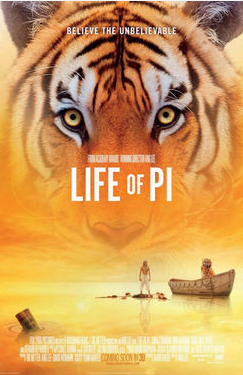
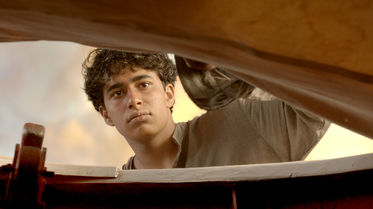 I think this is a case of a filmmaker being slavishly faithful to the original novel by Yann Martel. Many believed the book was unfilmable, so maybe Lee took that as a literal challenge. There is stuff here that I'm sure would work in a book, but on film, comes across as a bad idea. A good example of this would be the third act of the film, where Pi mainly sits in a bed, telling a story. Instead of showing us or dramatizing the events he's explaining, we watch him simply sit there and talk. Given the visuals we have seen up to this point in the film, this is disappointing. When the characters are simply left to their own devices and talk, the movie slows down. The narrative and the emotional impact of the story being told just cannot hold a candle to the effects, this time around.
I think this is a case of a filmmaker being slavishly faithful to the original novel by Yann Martel. Many believed the book was unfilmable, so maybe Lee took that as a literal challenge. There is stuff here that I'm sure would work in a book, but on film, comes across as a bad idea. A good example of this would be the third act of the film, where Pi mainly sits in a bed, telling a story. Instead of showing us or dramatizing the events he's explaining, we watch him simply sit there and talk. Given the visuals we have seen up to this point in the film, this is disappointing. When the characters are simply left to their own devices and talk, the movie slows down. The narrative and the emotional impact of the story being told just cannot hold a candle to the effects, this time around.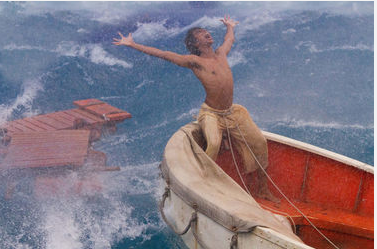 We are introduced to Pi Patel (Suraj Sharma) as a young boy living in India. He is teased by the other children at school, because of his full name, Piscene, which sounds to the kids like "pissing". So, he shortens his name to "Pi", and goes by it from that day on. We witness Pi's early life, and how he gains his views on religion, and his experiences with the other animals at the zoo that his father (Adil Hussain) owns. We watch him grow into a young man, learning about love and the hardships of life. Eventually, economic problems force Pi's family to move themselves, and all the zoo animals, to Canada for a new life. They board a freighter to take them across the ocean. About halfway through the journey, the ship is caught in a storm, and only Pi and four other animals (a hyena, an orangutang, a zebra, and a tiger named Robert Parker) manage to escape and survive the disaster.
We are introduced to Pi Patel (Suraj Sharma) as a young boy living in India. He is teased by the other children at school, because of his full name, Piscene, which sounds to the kids like "pissing". So, he shortens his name to "Pi", and goes by it from that day on. We witness Pi's early life, and how he gains his views on religion, and his experiences with the other animals at the zoo that his father (Adil Hussain) owns. We watch him grow into a young man, learning about love and the hardships of life. Eventually, economic problems force Pi's family to move themselves, and all the zoo animals, to Canada for a new life. They board a freighter to take them across the ocean. About halfway through the journey, the ship is caught in a storm, and only Pi and four other animals (a hyena, an orangutang, a zebra, and a tiger named Robert Parker) manage to escape and survive the disaster.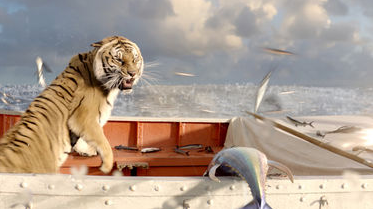 For the next hour, we witness Pi's hardships being lost at sea on a lifeboat. Three of the animals are killed or eaten quite quickly, until only Robert Parker the tiger remains with Pi. Fearing the tiger, Pi builds a small raft which is tethered to the life boat, so that he can be safe and have his own space away from the predatory animal. But eventually, circumstances force Pi to face his fears, and create an uneasy trust with the animal, forcing them to work together to survive. During their journey to find help, Pi encounters many wondrous sights at sea, as well as an island that seems peaceful during the day, but is deadly at night. Any suspense that may have risen from this sequence, and Pi's many near encounters with death, are diminished by the poor decision to open and end the film with a middle aged Pi (Irrfan Khan) telling this story to a Canadian author (Rafe Spall). Since we know the outcome in advance, it lessens the tension that some of these scenes out at sea could have created.
For the next hour, we witness Pi's hardships being lost at sea on a lifeboat. Three of the animals are killed or eaten quite quickly, until only Robert Parker the tiger remains with Pi. Fearing the tiger, Pi builds a small raft which is tethered to the life boat, so that he can be safe and have his own space away from the predatory animal. But eventually, circumstances force Pi to face his fears, and create an uneasy trust with the animal, forcing them to work together to survive. During their journey to find help, Pi encounters many wondrous sights at sea, as well as an island that seems peaceful during the day, but is deadly at night. Any suspense that may have risen from this sequence, and Pi's many near encounters with death, are diminished by the poor decision to open and end the film with a middle aged Pi (Irrfan Khan) telling this story to a Canadian author (Rafe Spall). Since we know the outcome in advance, it lessens the tension that some of these scenes out at sea could have created.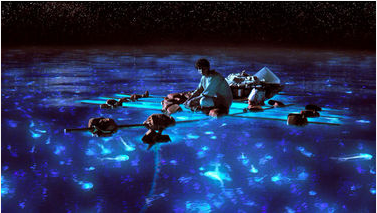 This is a real problem, because without the advance knowledge, this whole middle sequence of Life of Pi could have been a thrilling survival story. I guess it still is (the whole segment at sea, which makes up most of the film, is the strongest), it's just not as strong as it could have been if the film had not used a flashback approach to its storytelling. I admired that the screenplay by David Magee uses minimal dialogue for pretty much the entire "lost at sea" part of the story, with only occasional voice over narration to move things along. It does create a sense of putting the audience into the situation. This is also where the film is strongest in its visual effects, using CG to create Richard Parker. I, for one, was completely fooled. It looks and moves exactly like a real tiger would, and you really can't tell that it's not really there. The other visual effects (such as the shipwreck, and a beautiful sequence concerning a whale) are also stunning, but it's the tiger that really takes the prize.
This is a real problem, because without the advance knowledge, this whole middle sequence of Life of Pi could have been a thrilling survival story. I guess it still is (the whole segment at sea, which makes up most of the film, is the strongest), it's just not as strong as it could have been if the film had not used a flashback approach to its storytelling. I admired that the screenplay by David Magee uses minimal dialogue for pretty much the entire "lost at sea" part of the story, with only occasional voice over narration to move things along. It does create a sense of putting the audience into the situation. This is also where the film is strongest in its visual effects, using CG to create Richard Parker. I, for one, was completely fooled. It looks and moves exactly like a real tiger would, and you really can't tell that it's not really there. The other visual effects (such as the shipwreck, and a beautiful sequence concerning a whale) are also stunning, but it's the tiger that really takes the prize.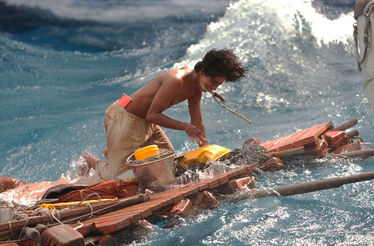 So, yes, there are a lot of strengths to this film. It's well-acted (mostly by a cast of unknowns, which was probably a good idea), and the footage at sea is quite beautiful and can be powerful. There was just something holding me back the entire time, and that something was I didn't really get involved that much in the character of Pi. He never came across as someone who truly grabbed my attention. As he sets about on his spiritual journey, I never truly got involved. The first half of the film, which shows us his life in India, goes on too long, and never really shows us anything remarkable. We're left waiting for the shipwreck, and while the results are worth it, even then, Pi never came across as someone I could truly care about. This is not the fault of the actor, who is quite good. He just never truly grabbed me as a character.
So, yes, there are a lot of strengths to this film. It's well-acted (mostly by a cast of unknowns, which was probably a good idea), and the footage at sea is quite beautiful and can be powerful. There was just something holding me back the entire time, and that something was I didn't really get involved that much in the character of Pi. He never came across as someone who truly grabbed my attention. As he sets about on his spiritual journey, I never truly got involved. The first half of the film, which shows us his life in India, goes on too long, and never really shows us anything remarkable. We're left waiting for the shipwreck, and while the results are worth it, even then, Pi never came across as someone I could truly care about. This is not the fault of the actor, who is quite good. He just never truly grabbed me as a character.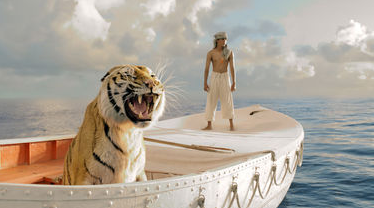
See the movie times in your area or buy the DVD at Amazon.com!






0 Comments:
Post a Comment
<< Home